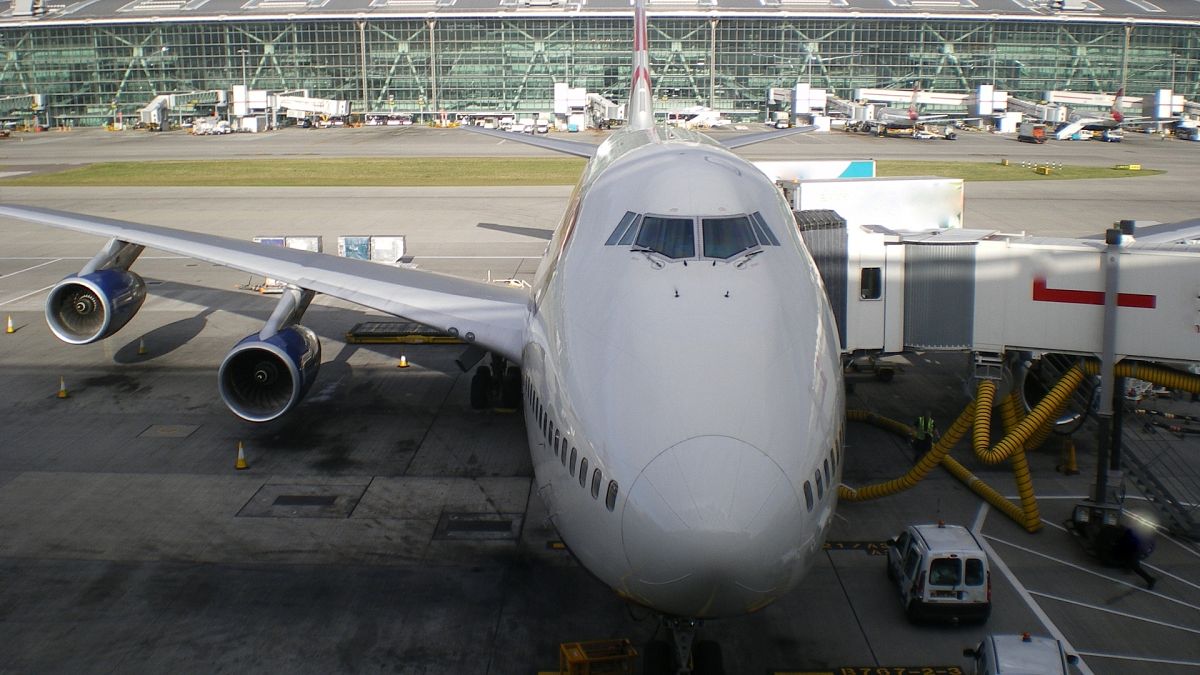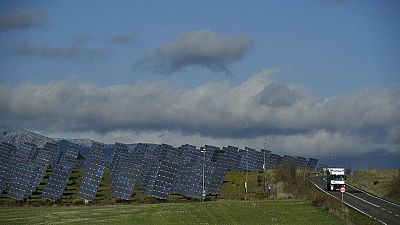The UK has halved its passenger tax on domestic flights. Here's how it compares to other European countries.
Passenger duty fees have been cut in half for UK domestic flights.
The move aims to make flights more affordable for passengers and “bolster UK connectivity”, according to the government.
Low cost airlines that lobbied for the tax cut are already ramping up their operations in response.
But the decision to incentivise air travel has left environmental activists dismayed.
“This is not a joke. Yes, today the government has halved APD on domestic flights, making it even cheaper for people to fly. Apparently this is ‘in line with our environmental objectives,’” tweeted anti-flying movement Flight Free UK.
When countries like France and Belgium are cracking down on polluting short-haul flights, many are questioning why the UK is promoting them.
What is air passenger duty?
Air passenger duty (APD) is a tax charged per passenger flying from UK airports. It is determined in bands by flight distance and cabin class.
It was previously set at £13 (€15) for UK domestic flights.
On 1 April, the UK government slashed the tax by 50 per cent for flights between airports in England, Scotland, Wales and Northern Island. It is now fixed at £6.50 (€7.50).
Rates for short- and long-haul flights from the UK have only increased in line with the retail price index, constituting a real terms freeze.
However, duty for highly polluting ‘ultra long-haul’ flights of more than 8,850 km from London will face a slightly increased rate of £91 (€104).
Not all European countries charge a ticket tax, however, and the UK’s airfare taxes are significantly higher than those of the Netherlands, Germany, France, Italy and Spain.
Airlines across Europe enjoy exemptions from fuel and ticket tax.
What will the reduced passenger duty mean for UK travel?
As ticket prices drop, passengers are likely to opt for flights instead of trains.
A recent study by consumer advocate Which? found that train prices in the UK were a third more expensive than flights on average. Only three out of 10 routes were found to be cheaper by train.
This will result in higher travel emissions. A one-way flight from London to Edinburgh - one of the UK’s key routes - emits around 0.27 tonnes of CO2 compared to just 0.02 tonnes by train, according to Carbon Footprint Calculator.
Airlines are already increasing their domestic routes to prepare for a spike in demand.
Ryanair has announced nine new domestic routes for its summer schedule. New routes include Belfast to Cardiff, Edinburgh, the East Midlands, Manchester and Stansted; Edinburgh to Newquay and Stansted; Newquay to Stansted; and Bournemouth to Edinburgh.
Eastern Airways is also offering a Newquay-East Midlands flight while Aer Lingus is launching links from Belfast to Newquay and Jersey.
The UK government also recently announced it would continue funding the Derry-London flight route. The £1.1 million (€1.3m) subsidy will enable up to 19 return flights every week between Northern Ireland and England.
Increasing the tax on ultra long-haul flights from London, meanwhile, may encourage polluting stopovers to break up the journey, and departures from other airports.
UK plans to decarbonise air travel were thrown into question earlier this year after a report found that sustainable aviation fuels were not within reach.
How do the UK’s policies compare to the rest of Europe?
Elsewhere in Europe, countries are reducing domestic air travel and ramping up rail connectivity in line with environmental objectives.
In December, France banned domestic flights between cities that can be reached by train in under 2.5 hours. Just days later, Belgium increased duties on flights shorter than 500 km.
Austria had already enacted a similar policy banning domestic flights covering distances that could be reached within three hours by train.
Meanwhile, the EU is encouraging greener modes of travel by boosting rail connectivity across the continent.
Various countries are encouraging citizens to opt for public transport over cars and planes by offering cheap - or even free - tickets. On 1 May, for example, Germany will launch its €49 monthly public transport subscription service.
In Spain, low-cost rail operators are rivalling budget airlines. Whereas in the UK, train ticket prices are prohibitively expensive.
Luxembourg has taken things to the next level, having recently celebrated three years of free public transport - designed to incentivise greener travel.















